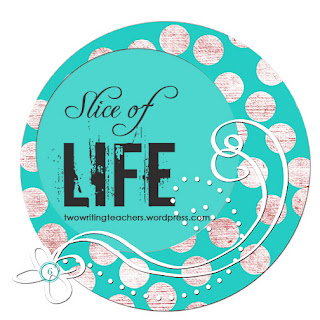 It's Monday! What Are You Reading? is hosted by Shelia at Book Journeys. Jen Vincent at Teach Mentor Texts and Kellee Moye at Unleashing Readers give the meme a kidlit spin. Open your Amazon wish list or your "to be read" list in GoodReads as you visit participating blogs. You'll find some great titles to keep you reading.
It's Monday! What Are You Reading? is hosted by Shelia at Book Journeys. Jen Vincent at Teach Mentor Texts and Kellee Moye at Unleashing Readers give the meme a kidlit spin. Open your Amazon wish list or your "to be read" list in GoodReads as you visit participating blogs. You'll find some great titles to keep you reading.Last week's read alouds went well. For the first time in memory, I had students snag books the first day or two of school, read them and return them the very next day. Whoa. I have readers in my room!
I have readers in my room who care about books. Saturday night I got a late night text from a student who had just finished The Fault in Our Stars. She didn't love the book and that worried her. She texted to ask what I loved about the book. Wow. Our reading conversations have just started. I'm hooked.
Thursday we previewed books in class. I like to give students a Book Pass organizer with the current year's Florida Teen Reads book covers along the margins. Our school's literacy council hosts reading events around these titles all year and all English and reading teachers get a set of the current year's Teen Reads titles. I think all of the titles in my set got checked out: amazing.
 Luckily I had tucked The Healing: a novel by Jonathan Odell and Sarah Stevenson's The Latte Rebellion in my school to bring home to read this weekend. The Healing is wonderful. It's a multi-generational story of Granada, a slave girl, who comes into her own as an apprentice to Polly Shine, a women who heals slaves. Grenada heals on many levels and I especially like how Odell weaves time through a perspective and story threads.
Luckily I had tucked The Healing: a novel by Jonathan Odell and Sarah Stevenson's The Latte Rebellion in my school to bring home to read this weekend. The Healing is wonderful. It's a multi-generational story of Granada, a slave girl, who comes into her own as an apprentice to Polly Shine, a women who heals slaves. Grenada heals on many levels and I especially like how Odell weaves time through a perspective and story threads.I didn't read as many books as I wanted to this weekend. I spent most of my reading time on students' surveys and letters and narratives --the initial assessments that make up our first week of school.

Still, I finished Crichton's Next, a novel about genetics and genetic manipulation. There is a talking African Grey, a multi-lingual orangutan and lawsuit between a bio-engineering start up and a cancer survivor. The idea that our very essence, our cells can be owned and commercial exploited is an exciting thread in Crichton's plot.
And I re-read Sara Kajder's Adolescents and Digital Literacies this week with the purpose of really connecting to how Kajder coaches teachers in the book. I love Sara's work. She consistently pushes my thinking and affirms my beliefs about what it means to be a good teacher.
Up Next
James Paul Gee's Social Linguistics and Literacies: Ideology in Discourses came in the mail this week. It's a dense read that I will likely take my time with. This week I plan to re-read Peter Johnston's Opening Minds. Johnston reminds me that language is world building. I want the world my students and I construct in our classroom this year to be inclusive, engaging and true.






















